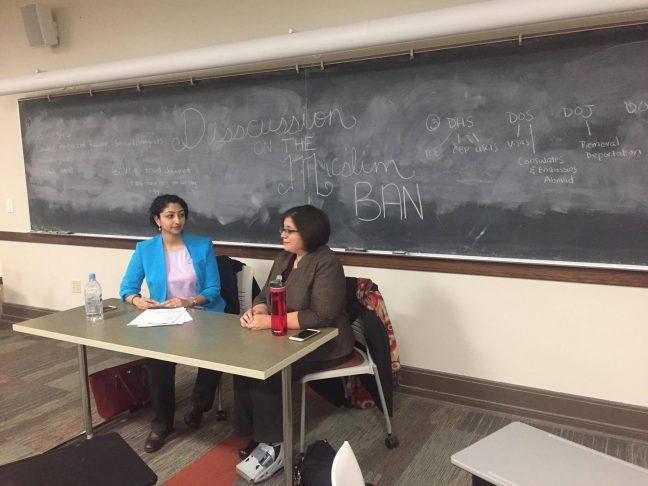As the nation continues to protest President Donald Trump’s executive order, students, community members and immigration lawyers gathered to discuss the travel ban and its effect on the Muslim population.
Trump’s executive order banned people from seven Muslim-majority countries from entering the U.S. for 90 days, prompting concern from both immigrants and people who are temporarily working or studying in the country.
The Muslim Student Association hosted the Wednesday discussion. Shabnam Lofti, a local immigrant lawyer said even permanent residents need to be wary because there is a chance they could be deported if they have a criminal record or lie on records such as voting documents.
But Lofti said the ban most affects non-immigrants — or people who are here on work or student visas — and undocumented immigrants.
Lofti also mentioned the exception for religious minorities within the ban, referencing Trump’s emphasis on admitting Christian refugees before Muslim ones.
“If you are a [religious] minority in that country, you will have priority over getting a refugee visa over anybody else,” Lofti said. “It’s not about the country of origin, but really about religious affiliations.”
In the same vein, Shareen Yousuf, a University of Wisconsin graduate student, said throughout history, black and brown people were made into “problems.” But Muslims are not the problem, she said — white supremacy is.
In Photos: UW students gather on Bascom to protest refugee executive order
Another immigration lawyer, Freya Katkowsky, discussed what to do when questions of legality arise.
If ever arrested, non-immigrants and undocumented immigrants should hire an immigration attorney and a criminal attorney, Katkowsky said. Hiring both is important because immigration courts function separately from criminal ones, so most immigration lawyers don’t understand the consequences of criminal convictions, and vice versa, she said.
After discussing what legal steps one should take if they find themselves in that situation, the group discussed how to get people active in their communities.
Asifa Quraishi-Landes, a professor of constitutional law at the UW Law School, encouraged people to speak out their stories through media.
“Some people come to me and say they haven’t seen their husband in three years and ‘my husband doesn’t know his child,'” Lofti said. “It’s so hard to hear this and not be affected.”
But Quaraishi-Landes said this need for Muslims to “humanize themselves” also raises problems. She said it promotes the “problematic ideology” that “if these people aren’t the most beautiful people in the world, then we shouldn’t let them in.”
To organize and support each other, Lofti suggested finding creative ways of voicing opposition to measures like Trump’s travel ban.
In photos: Madison community stands in solidarity with refugees
Yousuf suggests building solidarity with other groups that have been experiencing marginalized oppression because it is “something minority groups have in common.”
“When people of color, Muslims, LGBTQ+ members and women organize together, they are the overwhelming majority,” Yousuf said. “This is an opportunity to engage with [other] communities that have been dealing with the struggle for so long and not jump on their back…but work with them.”


